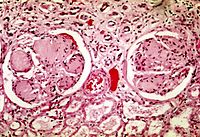
Photo from wikipedia
The prevalence of type 2 diabetes is catalyzing a pandemic in kidney disease, with ensuing cardiovascular complications. The effort to identify antidiabetic agents capable of promoting benefits that go beyond… Click to show full abstract
The prevalence of type 2 diabetes is catalyzing a pandemic in kidney disease, with ensuing cardiovascular complications. The effort to identify antidiabetic agents capable of promoting benefits that go beyond the bounds of glucose control has produced remarkable outcomes in recent cardiovascular outcomes trials in patients with type 2 diabetes mellitus, many of whom have diabetic kidney disease. Two novel antidiabetic drug classes, sodium-glucose cotransporter 2 inhibitors (SGLT2is) and glucagon-like peptide-1 receptor agonists (GLP-1 RAs), improve cardiovascular outcomes in different ways, with SGLT2is reducing the risk of heart failure and cardiovascular death and GLP-1 RAs being associated with reduced risk of myocardial infarction and cardiovascular death. Further mechanistic studies and additional cardiovascular outcome trials are ongoing and are expected to determine whether these benefits are a result of class effect, as well as to delineate optimum timing for intervention and population target.
Journal Title: Kidney international supplements
Year Published: 2018
Link to full text (if available)
Share on Social Media: Sign Up to like & get
recommendations!